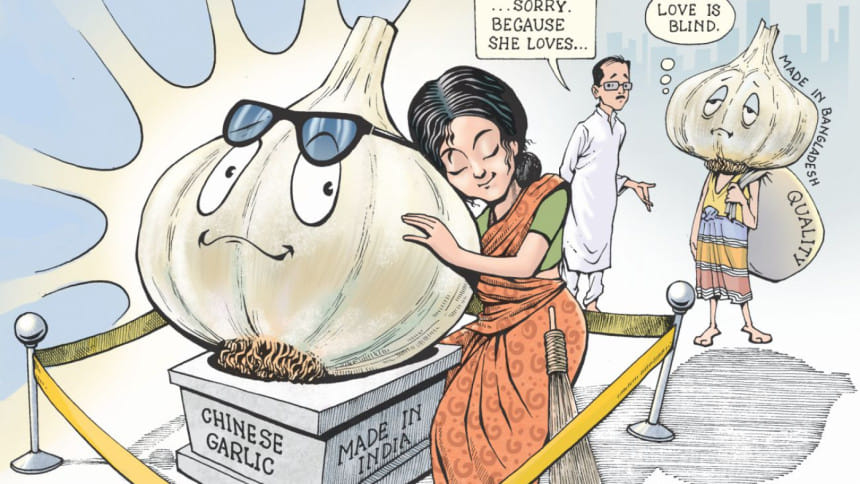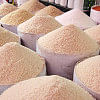GARLIC gone crazy

When the price of garlic in China is plummeting with a huge harvest in the country's north, Bangladesh is seeing price hike of imported garlic.
The state-run Trading Corporation of Bangladesh (TCB) recorded a 64.29 percent rise in imported garlic price in the domestic market, from Tk 220 a kg in June last year to Tk 360 on Wednesday.
Importers and traders in the city's wholesale market, Shyambazar, and Chittagong's Khatunganj told The Daily Star that the last shipments of imported Chinese garlic had already been exhausted.
They said some traders were conning buyers by charging exorbitantly for relatively large Indian and Egyptian garlic, claiming those to be Chinese. Those traders were taking advantage of a newfound consumers' preference of large Chinese garlic over smaller home-grown ones.
They said there was no point in buying the pricey imported ones when local varieties were available for Tk 100-130 a kg.
According to the commerce ministry, the country now produces 2.7 lakh tonnes of garlic a year against a yearly demand of 5.5 lakh tonnes. Only six years ago, Bangladesh produced just 1.4 lakh tonnes.
Yet, in the last financial year, Bangladesh spent over Tk 1,700 crore to import garlic.
Harun-ur-Rashid, a Federation of Bangladesh Chamber of Commerce and Industries (FBCCI) official, who keeps track of market prices of essential commodities, told The Daily Star that just a few years ago the Chinese garlic used to sell in Bangladesh markets at half the price of local ones.
Some homemakers observe that house helps developed a preference to Chinese garlic over the years since they are easier to peel.
Harun said even though untimely rain in early garlic season has had some impact on production, but locally grown garlic was aplenty in the market.
He advised consumers not to go for pricey imported ones as "you'll get Chinese garlic below Tk 100 kg price soon with the new harvest pouring in".
Media in China reported that prices of freshly harvested garlic dropped by 30 percent over the last fortnight.
Ratan Saha, a Shyambazar-based agent of Chinese garlic exporters to Bangladesh, told The Daily Star on Wednesday, "Last shipments of Chinese garlic imported in February/March have already exhausted. Garlic prices were high in China then. But within a week's time Bangladeshi importers would bring in new shipments and the price will be much less."
Khatunganj traders told our Chittagong bureau chief that stock of Chinese garlic started running out in their wholesale hub a month ago which resulted in higher prices of garlic.
The stock of Chinese garlic was almost gone, the wholesalers said seeking anonymity, adding that similar varieties smuggled into India from China was being sold there for Tk 185 to Tk 200 a kg.
Ratan Saha encouraged consumers to go for locally-grown garlic, which was selling for Tk 60 to 70 a kg in Shyambazar.
Asked why the home-grown garlic was also being sold for Tk 100-130 a kg in the city's kitchen markets, and street vendors were hawking Tk 150-160 a kg, Ratan Saha said, "That's altogether a different question and the government has to answer that.
"In numerous meetings at the commerce ministry we've asked the government to stop the menaces of illegal toll collections by law enforcers and politically-linked goons ... otherwise, the wide gap of prices between wholesale and retail markets would not shrink," Ratan said.
Accompanied by the finance minister in a post-budget press briefing in the city this month, Industries Minister Amir Hossain Amu, however, passed the blame on to traders. He said there was no dearth in the supply of essentials but a section of unscrupulous traders were hiking prices of goods without any reason.
“Businesspeople have a tendency to increase prices of essentials during the Ramadan. We need to enact laws to prevent them from raising prices of items without any valid reason,” Amu had said.
Though wholesalers claimed of selling local garlic for Tk 60-70 a kg in Shyambazar yesterday, The Daily Star correspondent found retailers were selling the same for Tk 150 a kg at New Market on Wednesday. A street vendor in Dhanmondi was asking Tk 160 and Tk 350 for a kg of local and so-called Chinese garlic.
The gap between wholesale and retail prices was also evident in the port city where larger Indian garlic was being sold for Tk 85-100 a kg in wholesale but for Tk 230-240 in retail. Smaller Indian garlic was being sold at Tk 35-40 a kg in wholesale and Tk 100 in retail.
Boloy Podder, proprietor of Grameen Banijjyalaya, a wholesaler in Khatunganj said the price would drop with the availability of Chinese garlic of the new season in two week's time.
With over 20 million tonnes of annual garlic production, China emerges as a major exporter of the bulbous spice in recent years with its export volume reaching almost two million tonnes this year.
Chinese garlic's export destinations include Indonesia, Vietnam, Malaysia, the US, Brazil, and Bangladesh.

 For all latest news, follow The Daily Star's Google News channel.
For all latest news, follow The Daily Star's Google News channel. 








Comments